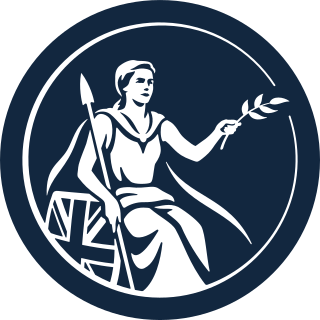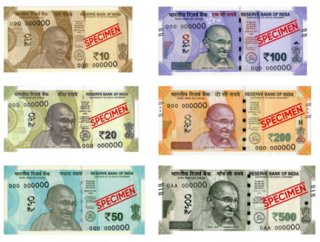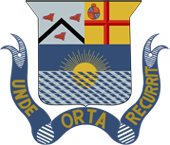Related Research Articles

The Bank of England is the central bank of the United Kingdom and the model on which most modern central banks have been based. Established in 1694 to act as the English Government's banker, and still one of the bankers for the Government of the United Kingdom, it is the world's eighth-oldest bank. It was privately owned by stockholders from its foundation in 1694 until it was nationalised in 1946 by the Attlee ministry.

Odisha, formerly Orissa, is an Indian state located in Eastern India. It is the 8th-largest state by area, and the 11th-largest by population, with over 41 million inhabitants. The state also has the third-largest population of Scheduled Tribes in India. It neighbours the states of Jharkhand and West Bengal to the north, Chhattisgarh to the west, and Andhra Pradesh to the south. Odisha has a coastline of 485 kilometres (301 mi) along the Bay of Bengal in Indian Ocean. The region is also known as Utkala and is mentioned by this name in India's national anthem, "Jana Gana Mana". The language of Odisha is Odia, which is one of the Classical Languages of India.

The Reserve Bank of India, abbreviated as RBI, is India's central bank and regulatory body responsible for regulation of the Indian banking system. It is under the ownership of Ministry of Finance, Government of India. It is responsible for the control, issue and maintaining supply of the Indian rupee. It also manages the country's main payment systems and works to promote its economic development. Bharatiya Reserve Bank Note Mudran (BRBNM) is a specialised division of RBI through which it prints and mints Indian currency notes (INR) in four of its currency printing presses located in Nashik, Dewas, Mysore and Salboni. The RBI established the National Payments Corporation of India as one of its specialised division to regulate the payment and settlement systems in India. Deposit Insurance and Credit Guarantee Corporation was established by RBI as one of its specialised division for the purpose of providing insurance of deposits and guaranteeing of credit facilities to all Indian banks.

Bimal Jalan is a former Governor of Reserve Bank of India and was a nominated member of the Upper House of India's Parliament, the Rajya Sabha during 2003–2009.

The Indian rupee is the official currency in India. The rupee is subdivided into 100 paise. The issuance of the currency is controlled by the Reserve Bank of India. The Reserve Bank manages currency in India and derives its role in currency management on the basis of the Reserve Bank of India Act, 1934.

The Pakistani rupee is the official currency in the Islamic Republic of Pakistan and an unofficial one in the Islamic Emirate of Afghanistan. The issuance of the currency is controlled by the State Bank of Pakistan. It was officially adopted by the Government of Pakistan in 1949. Earlier the coins and notes were issued and controlled by the Reserve Bank of India until 1949, when it was handed over to the Government and State Bank of Pakistan, by the Government and Reserve Bank of India.

Presidency College is an art, commerce, and science college in the city of Chennai in Tamil Nadu, India. On 16 October 1840, this school was established as the Madras Preparatory School before being repurposed as a high school, and then a graduate college. The Presidency College is one of the oldest government arts colleges in India. It is one of two Presidency Colleges established by the British in India, the other being the Presidency College, Kolkata.

Raghuram Govind Rajan is an Indian economist and the Katherine Dusak Miller Distinguished Service Professor of Finance at the University of Chicago's Booth School of Business. Between 2003 and 2006 he was Chief Economist and director of research at the International Monetary Fund. From September 2013 through September 2016 he was the 23rd Governor of the Reserve Bank of India. In 2015, during his tenure at the RBI, he became the Vice-Chairman of the Bank for International Settlements.
Puri is an Indian surname.
Bhaskar Namdeo Adarkar was the ninth Governor of the Reserve Bank of India from 4 May 1970 to 15 June 1970. His term was the second-shortest after Amitav Ghosh who had served for only 20 days. His term was short since he was filling in as interim before S. Jaganathan took over.
Sarukkai Jagannathan was the tenth Governor of the Reserve Bank of India from 16 June 1970 to 19 May 1975.

Ram Narain Malhotra popularly known as R. N. Malhotra was the seventeenth governor of the Reserve Bank of India (RBI), serving from 4 February 1985 to 22 December 1990.
Krishnanath Ganesh Ambegaonkar, known as K. G. Ambegaokar was the fifth Governor of the Reserve Bank of India from 14 January 1957 to 28 February 1957.

Sir Chintaman Dwarakanath DeshmukhICS was an Indian civil servant and the first Indian to be appointed the Governor of the Reserve Bank of India in 1943 by the British Raj authorities. He subsequently served as the Finance Minister in the Union Cabinet (1950–1956). It was during this time that he also became a founding member of the Governing Body of NCAER, the National Council of Applied Economic Research in New Delhi, India's first independent economic policy institute established in 1956 at the behest of Prime Minister Jawaharlal Nehru. After resignation from Union Cabinet he worked as Chairman of UGC (1956–1961). He served as Vice-Chancellor of University of Delhi (1962–67). He was also President of Indian Statistical Institute from 1945 to 1964, Honorary Chairman of National Book Trust (1957–60).
Lakshmi Kant Jha, MBE, born in Darbhanga district, Bihar was the eighth Governor of the Reserve Bank of India from 1 July 1967 to 3 May 1970.

Indraprasad Gordhanbhai Patel, popularly known as I. G. Patel, was an Indian economist and a civil servant who served as the fourteenth Governor of the Reserve Bank of India from 1 December 1977 to 15 September 1982.
Nirmal Chandra Sen Gupta was the eleventh Governor of the Reserve Bank of India from 19 May 1975 to 19 August 1975.

Chakravarthi Rangarajan is an Indian economist, a former Member of Parliament and 19th Governor of the Reserve Bank of India. He is the former Chairman of the Prime Minister's Economic Advisory Council, he resigned the day the UPA lost power. He is also the Chairman of the Madras School of Economics; former President of the Indian Statistical Institute; the Founding Chairman of the CR Rao Advanced Institute of Mathematics, Statistics and Computer Science; former Chancellor of the University of Hyderabad; and a professor in Ahmedabad University.

Yaga Venugopal Reddy is an Indian economist and a retired Indian Administrative Service (IAS) officer of the 1964 batch belonging to Andhra Pradesh cadre. Reddy served as governor of the Reserve Bank of India (RBI), India's central bank, from September 2003 until September 2008.
References
- ↑ "K R Puri". Reserve Bank of India. Archived from the original on 16 September 2008. Retrieved 15 September 2008.
- ↑ "List of Governors". Reserve Bank of India. Archived from the original on 16 September 2008. Retrieved 8 December 2006.
- ↑ Jain, Manik (2004). 2004 Phila India Paper Money Guide Book. Kolkata: Philatelia. p. 77.
